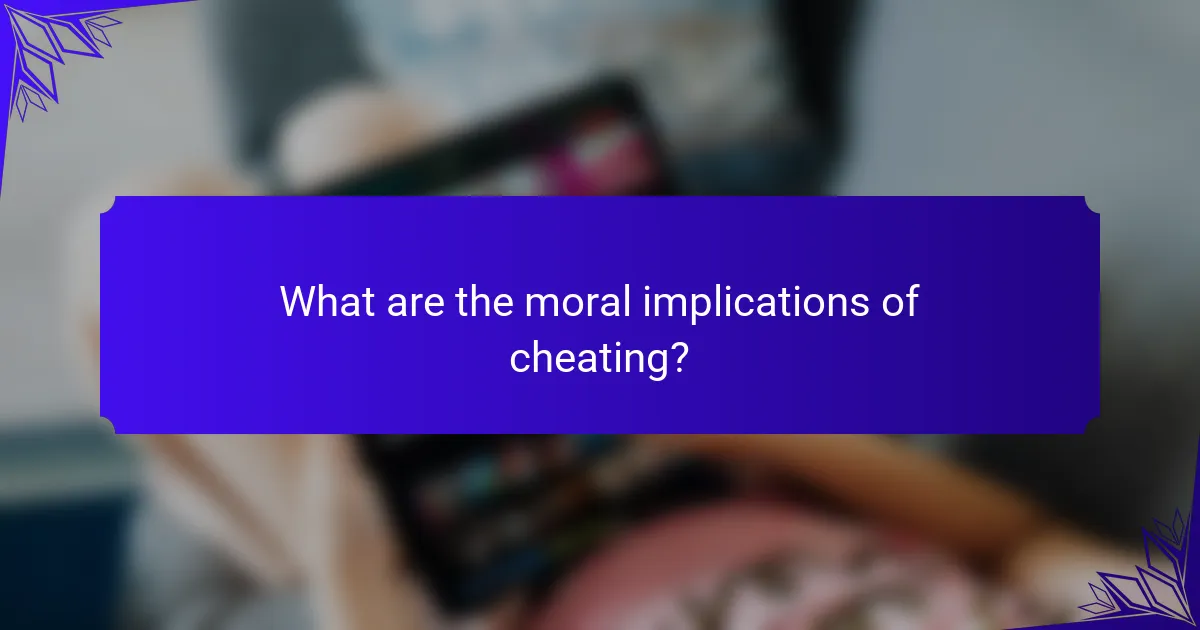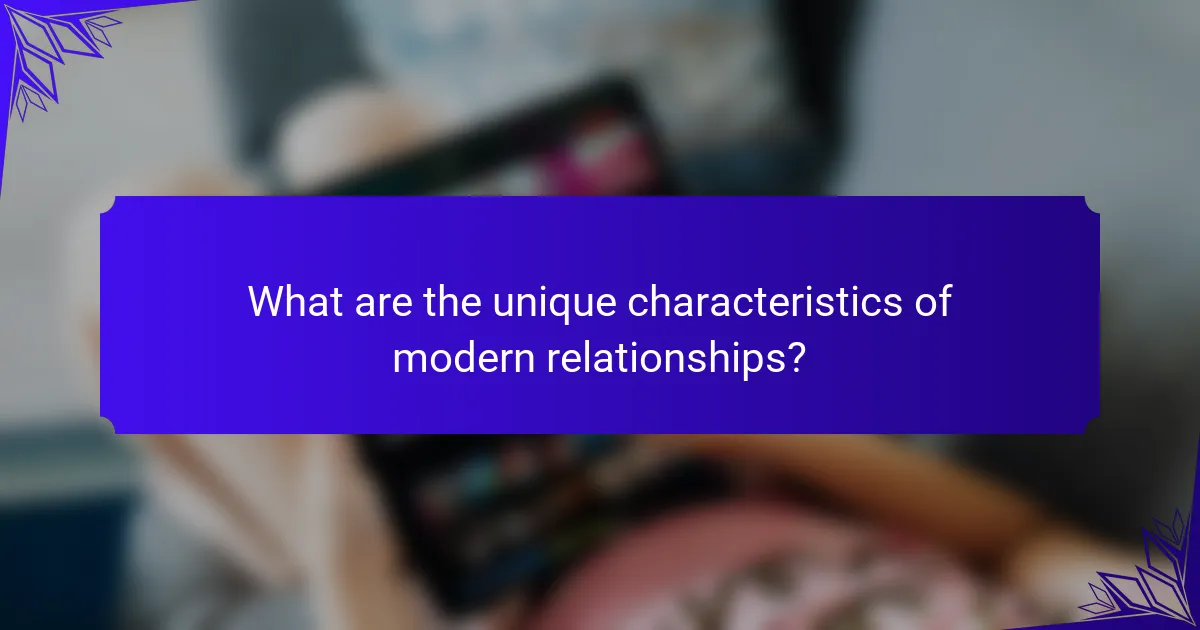Cheating raises important questions about morality and trust in relationships. This article explores its moral implications, delves into psychological conditioning, and examines the dynamics of modern relationships. Understanding these aspects can provide insights into the complexities of fidelity and emotional needs.

What are the moral implications of cheating?
Cheating is generally considered a sin, as it violates ethical principles and trust in relationships. It can lead to emotional harm, betrayal, and long-term psychological consequences. Cheating often stems from deeper issues, such as dissatisfaction or lack of communication. Its moral implications challenge the integrity of personal values and societal norms, prompting discussions on fidelity, honesty, and respect in modern relationships.
How do different cultures perceive infidelity?
Different cultures perceive infidelity through diverse moral lenses, often shaped by historical, religious, and social contexts. In many Western societies, infidelity is generally viewed as a betrayal of trust, leading to significant emotional and relational consequences. Conversely, some cultures may have more lenient views, where extramarital relationships are socially accepted under specific circumstances, reflecting unique cultural norms.
Religious beliefs heavily influence perceptions of infidelity. For instance, in Christianity, infidelity is often considered a sin, emphasizing fidelity as a moral duty. In contrast, some Eastern philosophies may focus on the pragmatic aspects of relationships, prioritizing social harmony over strict moral judgments.
Psychological conditioning also plays a role in how individuals interpret infidelity. Societal expectations and personal experiences shape responses to cheating, leading to varying degrees of acceptance or condemnation across cultures. This complexity highlights the need to understand infidelity within specific cultural frameworks, recognizing that moral implications are not universally applicable.
What ethical frameworks can be applied to cheating?
Ethical frameworks applied to cheating include deontological ethics, consequentialism, and virtue ethics. Deontological ethics focuses on adherence to rules, considering cheating inherently wrong regardless of outcomes. Consequentialism evaluates the outcomes of cheating, weighing potential benefits against harm. Virtue ethics emphasizes character, suggesting that cheating undermines personal integrity and moral development. Each framework offers distinct perspectives on the moral implications of cheating, shaping modern relationships and societal norms.
What is the role of consequentialism in evaluating cheating?
Consequentialism evaluates cheating by focusing on the outcomes of the act rather than the act itself. This ethical framework assesses whether cheating leads to greater overall happiness or harm. For example, if cheating results in significant benefits for one party while causing distress to others, the moral implications become complex. The context of modern relationships further complicates this evaluation, as emotional and psychological factors influence perceptions of cheating. Ultimately, consequentialism prompts a deeper analysis of the effects of cheating on individuals and society.
How does deontology view the act of cheating?
Deontology views cheating as inherently wrong due to its violation of moral duties and principles. Cheating undermines trust, which is essential in relationships and social contracts. According to deontological ethics, actions must adhere to universal moral laws, making cheating a breach of ethical obligations. This perspective emphasizes the importance of intention and the moral implications of one’s actions over the consequences. Cheating, therefore, is not just a personal failing but a moral transgression that affects the fabric of ethical relationships.

What psychological factors contribute to cheating?
Psychological factors contributing to cheating include low self-esteem, lack of emotional fulfillment, and impulsivity. Individuals may cheat to seek validation or excitement, often influenced by past experiences or relationship dynamics. Research indicates that attachment styles significantly affect infidelity tendencies, with insecure attachments correlating to higher rates of cheating.
How does attachment theory explain infidelity?
Attachment theory suggests that infidelity often stems from insecure attachment styles. Individuals with anxious or avoidant attachment may seek validation or emotional connection outside their primary relationship. This behavior can be viewed through the lens of psychological conditioning, where past experiences shape current relationship dynamics. Understanding these attachment styles helps explain the motivations behind cheating, highlighting the interplay between emotional needs and relational commitments.
What role does self-esteem play in cheating behaviors?
Self-esteem significantly influences cheating behaviors, often acting as a predictor of infidelity. Individuals with low self-esteem may cheat to seek validation or affirmation. Conversely, those with high self-esteem may cheat out of a desire for novelty or excitement, rather than insecurity. Research indicates that self-esteem impacts relationship satisfaction, which can correlate with the likelihood of cheating. Understanding these dynamics can provide insight into the moral implications of infidelity within modern relationships.
How can conditioning influence cheating decisions?
Conditioning can significantly influence cheating decisions by shaping an individual’s thoughts and behaviors. Psychological conditioning, such as classical and operant conditioning, can create associations that either promote or discourage infidelity. For instance, if a person experiences positive reinforcement in a relationship, they may be less likely to cheat. Conversely, negative experiences or lack of emotional fulfillment might condition someone to seek validation elsewhere. Understanding these dynamics helps in addressing the moral implications of cheating within modern relationships.
What are the effects of social conditioning on relationship fidelity?
Social conditioning significantly influences relationship fidelity by shaping perceptions of loyalty and commitment. Societal norms and expectations often dictate behavior, leading individuals to conform to certain relationship standards. For instance, cultural narratives around infidelity can normalize cheating, undermining trust. Psychological conditioning reinforces these behaviors through repeated exposure to infidelity in media and peer groups, impacting personal values. As a result, individuals may rationalize cheating, viewing it as less morally objectionable. Understanding these effects is crucial in addressing fidelity issues in modern relationships.
How does reinforcement learning relate to cheating?
Reinforcement learning can lead to cheating by creating environments where rewards for dishonest behaviour outweigh the consequences. This psychological conditioning affects moral decision-making. Cheating becomes a learned behaviour when individuals are reinforced for it, altering their perception of ethics in relationships. In this context, it is important to consider how personal development can play a role. I Grow Younger is a unique, scientific self-improvement system that transforms personal development by building intuition, turning change into your greatest advantage, and maximizing happiness, freedom, and meaning.

What are the unique characteristics of modern relationships?
Modern relationships are characterized by evolving definitions of commitment, communication styles, and individual autonomy. Cheating is often viewed through moral and psychological lenses, reflecting societal shifts. Unique attributes include the impact of technology on relationship dynamics and the growing acceptance of non-traditional arrangements. As a result, discussions around fidelity and morality are increasingly nuanced, emphasizing personal values and emotional needs.
How has technology changed the landscape of infidelity?
Technology has significantly transformed the landscape of infidelity by increasing accessibility and anonymity. Online platforms and social media enable discreet interactions, making it easier to engage in cheating. The rise of dating apps has blurred the lines of commitment, allowing individuals to explore connections outside their primary relationships. Additionally, technology facilitates emotional affairs through constant communication, altering traditional perceptions of fidelity. The psychological conditioning linked to instant gratification further complicates modern relationships, often diminishing the perceived moral implications of infidelity.
What impact do social media platforms have on cheating?
Social media platforms can significantly influence cheating by facilitating emotional connections and opportunities for infidelity. They create environments where users can easily engage with others outside their primary relationship. Studies indicate that 30% of adults admit to using social media for flirting, which can blur the lines of commitment. This behavior often stems from psychological conditioning, where the instant gratification of likes and interactions fosters a sense of validation that may lead to unfaithfulness. As a result, modern relationships face unique challenges in maintaining trust and fidelity amidst the pervasive influence of social media.
How do modern dating practices affect perceptions of cheating?
Modern dating practices can blur the lines of fidelity, leading to varied perceptions of cheating. With the rise of online dating and social media, emotional connections can develop outside committed relationships, often perceived as less serious than physical infidelity. Research indicates that younger generations view emotional cheating differently, considering it less harmful than traditional cheating. This shift reflects changing societal norms around relationships and fidelity. As a result, individuals may rationalize behaviors previously deemed unacceptable, complicating moral implications surrounding cheating.

What are the rare but notable consequences of cheating?
Cheating can lead to rare but significant consequences, including deep emotional trauma, loss of trust, and long-term relationship instability. Individuals may experience guilt, shame, or anxiety that can affect their mental health. Social repercussions may arise, impacting friendships and family dynamics. Additionally, in some cases, cheating can lead to legal consequences, especially in marriages or partnerships with financial entanglements. These outcomes highlight the complex moral and psychological implications of cheating in modern relationships.
How can infidelity lead to unexpected relationship growth?
Infidelity can catalyze unexpected relationship growth by prompting deep reflection and communication. Couples often confront underlying issues, leading to increased emotional intimacy and understanding. A study shows that 70% of couples who experience infidelity report improved communication afterward. This unique attribute of growth through adversity can transform a relationship, fostering resilience and stronger bonds. As a result, navigating the complexities of betrayal may ultimately enhance partnership dynamics.
What are the long-term psychological effects on the betrayed partner?
The long-term psychological effects on the betrayed partner can include depression, anxiety, and a diminished sense of self-worth. These effects often stem from feelings of betrayal and loss of trust. Research indicates that emotional distress may persist for years, impacting future relationships. Additionally, the betrayed partner may experience challenges in intimacy and vulnerability, which can hinder personal growth and relationship satisfaction. Addressing these issues through therapy can facilitate healing and rebuilding trust.
What unique legal implications can arise from cheating?
Cheating can lead to unique legal implications, including potential grounds for divorce, custody disputes, and financial settlements. In many jurisdictions, infidelity may influence court rulings regarding asset division and spousal support. Additionally, cheating can result in reputational damage, impacting professional relationships and contracts. In some cases, emotional distress claims may arise if one party can prove harm from the infidelity.

What are the best practices for maintaining fidelity in relationships?
Maintaining fidelity in relationships requires open communication, trust, and mutual respect. Establish clear boundaries to prevent misunderstandings. Regularly check in with each other to address concerns. Prioritize quality time together to strengthen the bond. Acknowledge and appreciate each other’s needs to foster a supportive environment.
How can couples effectively communicate to prevent cheating?
Effective communication can prevent cheating by fostering trust and understanding. Couples should prioritize open dialogue, actively listen to each other, and express feelings honestly. Establishing clear boundaries and discussing expectations can further strengthen the relationship. Regularly checking in on each other’s emotional needs enhances connection and reduces the likelihood of infidelity.
What strategies can be implemented to strengthen trust?
To strengthen trust in relationships, focus on open communication, consistency, and mutual respect. Establishing transparency fosters a safe environment for sharing feelings and concerns. Regularly demonstrating reliability through actions reinforces commitment. Additionally, practicing empathy builds emotional connections, enhancing trust over time.
What common mistakes should be avoided to uphold relationship integrity?
To uphold relationship integrity, avoid common mistakes like dishonesty, neglecting communication, and failing to address conflicts. These actions can erode trust and lead to disconnection. Prioritize transparency and active listening to strengthen bonds. Recognizing and correcting these behaviors can enhance relationship resilience.


